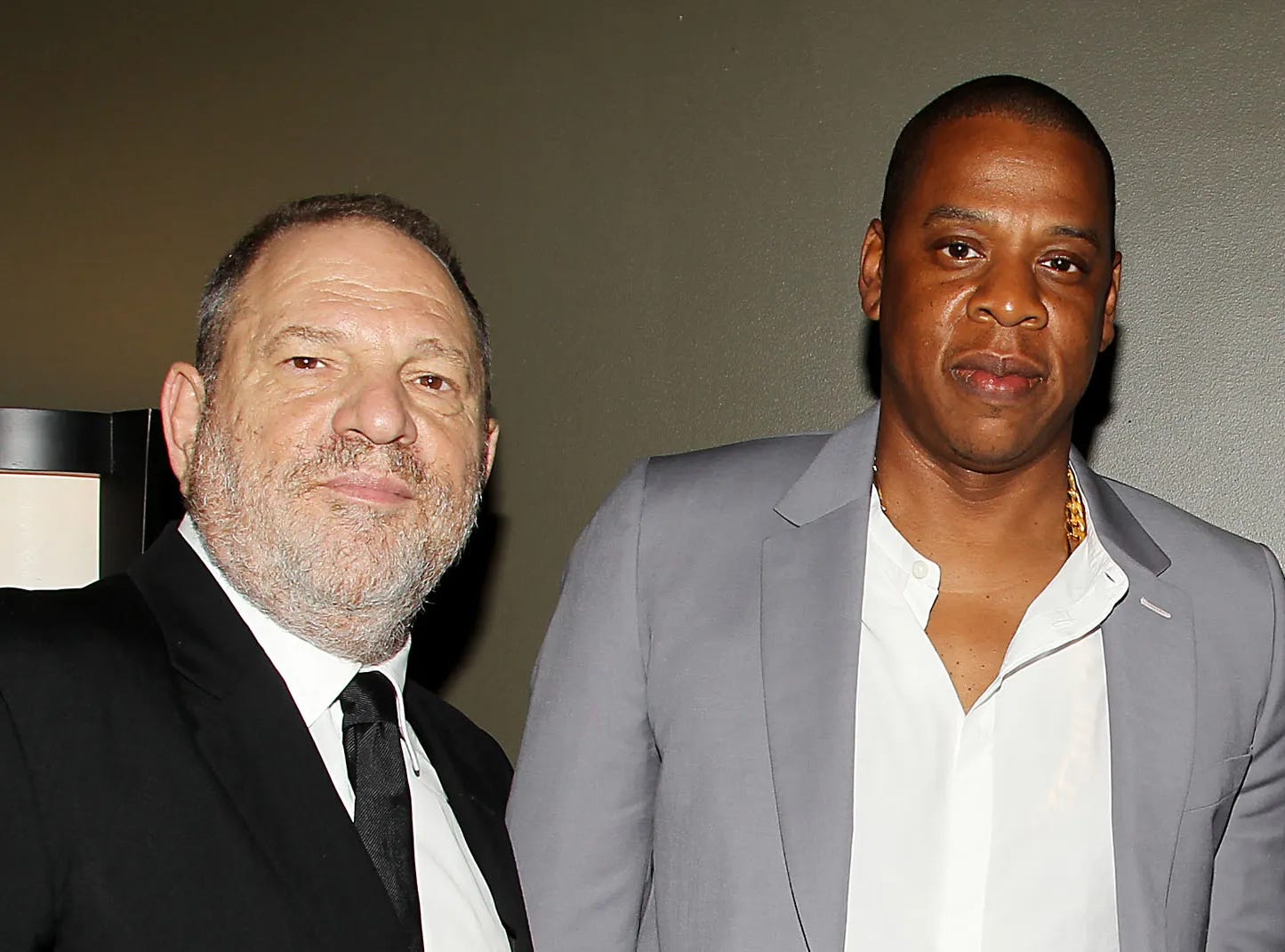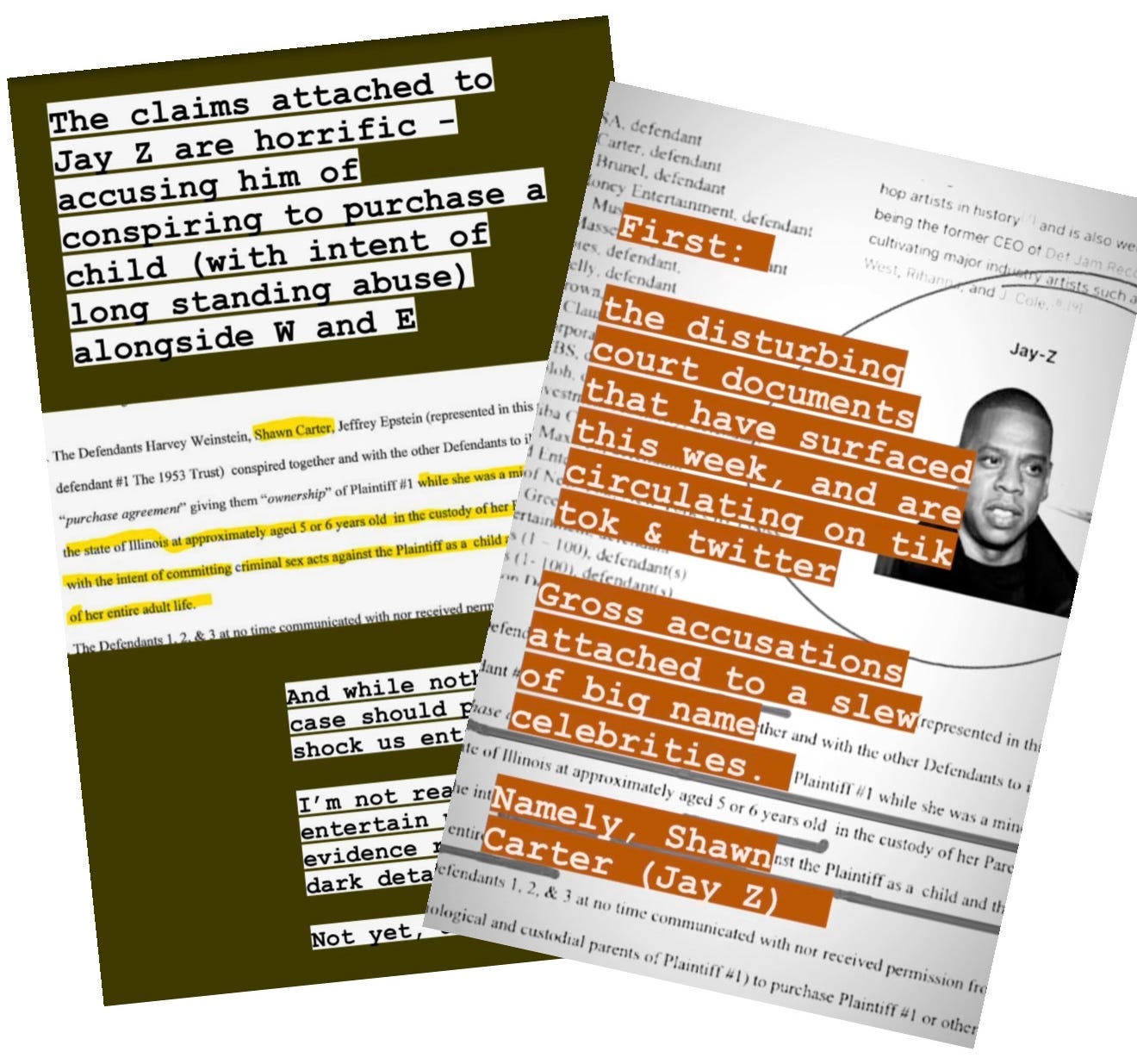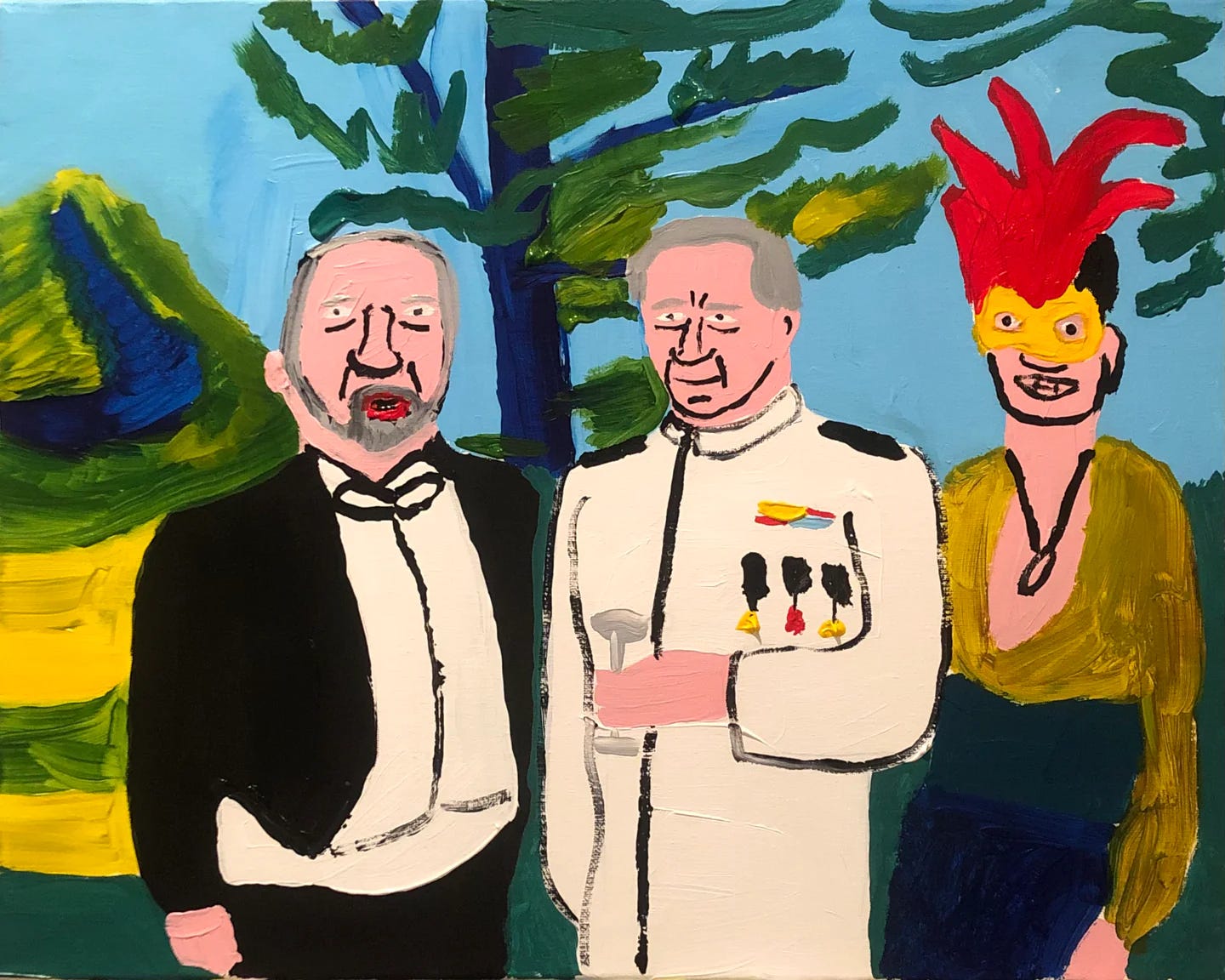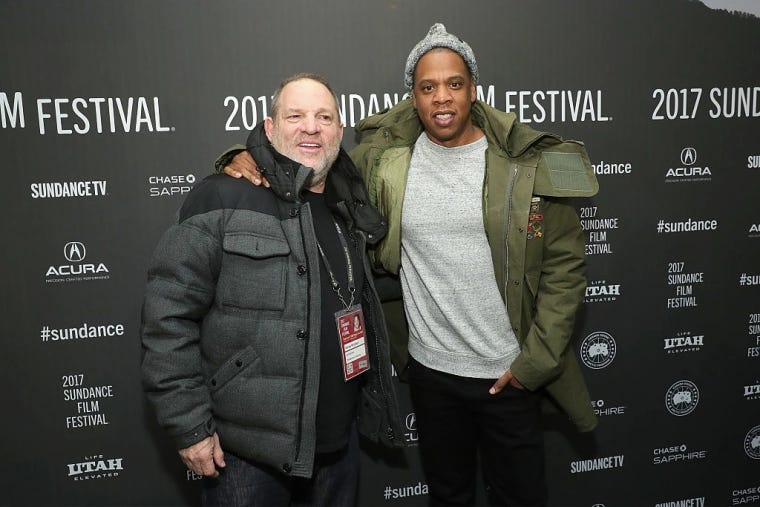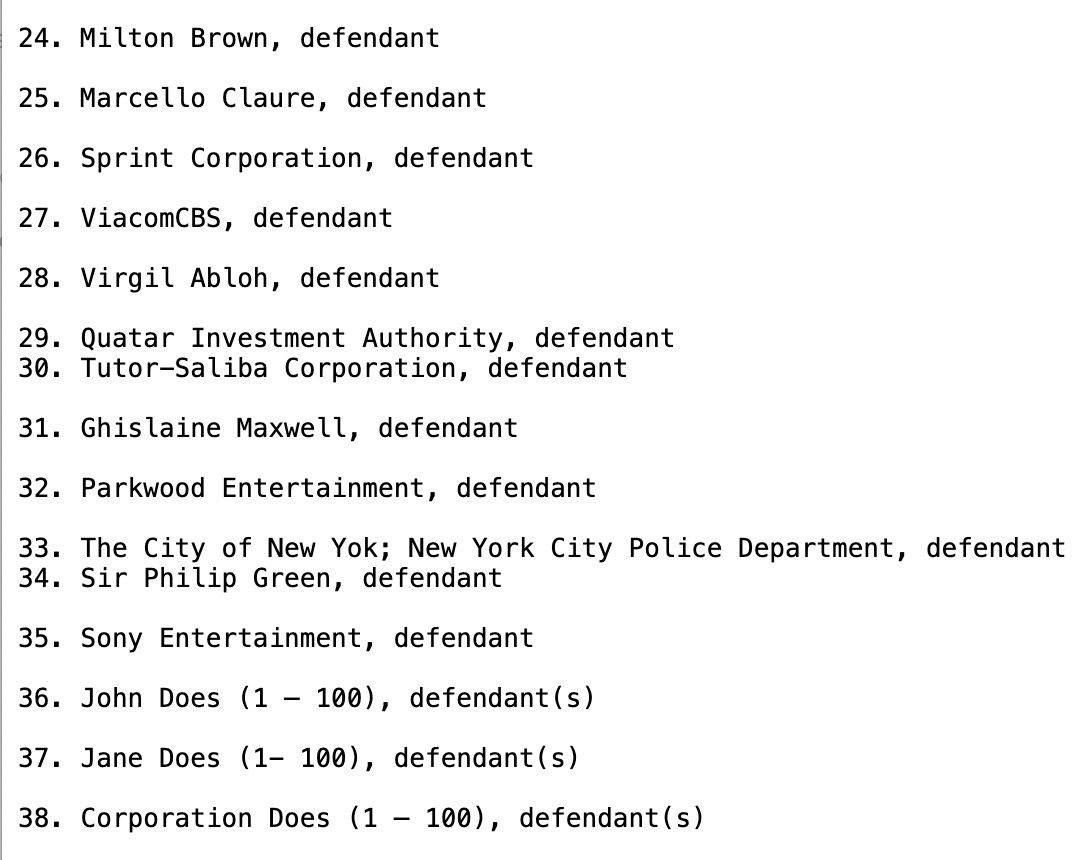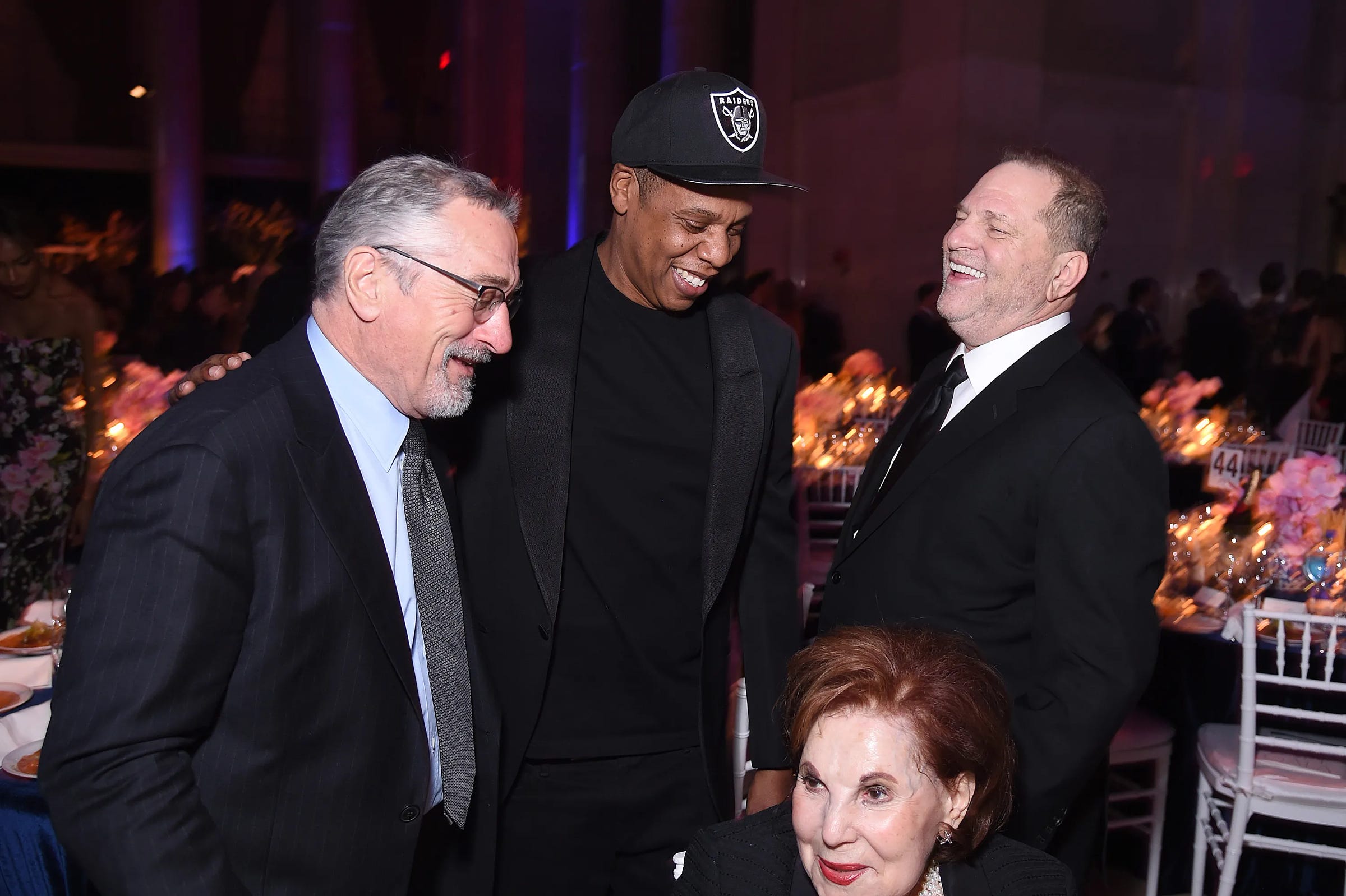Latham v. Epstein, Weinstein, and Jay-Z: Allegations of Trafficking, Exploitation, and a Cover-Up Spanning Decades
An unearthed 2020 Lawsuit dismissed as "frivolous"
I’ll never forget my first day in the overflow room of the federal courthouse in Manhattan during the Ghislaine Maxwell trial. I arrived too late to secure a seat in the main courtroom and ended up on the 5th floor—what had effectively become known as “QAnon headquarters.” Here, conspiracy-minded folk gathered to watch the trial on a big screen. During breaks, they traded theories about whatever elaborate stories were circulating the dark web that week. One topic that day stood out—an alarming lawsuit that had surfaced on Twitter. The allegations were horrifying, accusing Jay-Z of vile crimes, including sexual abuse, trafficking minors, and worse. At the time I dismissed it outright. The claims seemed too outlandish, the web of accused names too sprawling. I thought, There’s no way this could be real.
Fast forward three years, and I find myself wondering: Did we miss something huge? What happened to the plaintiffs? Why didn’t any media outlets investigate?
Curious for answers now with these latest allegations, I turned to Instagram asking for help tracking down this long-forgotten lawsuit. Not only did my followers uncover my old screenshots, but also the lawsuit itself, linked in full below the paywall.
Latham v. The 1953 Trust, Harvey Weinstein, Shawn Carter + Other Defendants
The lawsuit, revived from 2020 in the U.S. District Court for the Southern District of New York, resurfaced during the Maxwell trial with disturbing clarity. It challenges how we—both the public and the media—overlooked revelations of significant consequence. This sprawling case, deeply disturbing in nature, accuses dozens of powerful individuals and entities. Central to the complaint is a decades-long alleged conspiracy involving sexual abuse, trafficking, financial exploitation, and psychological torment—all of which, according to these allegations, have been covered up by some of the most influential figures in entertainment and business.
At the heart of the lawsuit is Plaintiff #3. She claims she became the target of a criminal retaliation campaign after she refused to allow her child, Plaintiff #1, to be sexually exploited by the defendants. Her refusal, according to the suit, triggered a violent and systematic attack on her family—an attack that included drugging and trafficking her children and grandchildren for the purposes of sexual exploitation. Additionally, the defendants allegedly engaged in economic abuses, such as theft of intellectual property and career interference aimed at decimating Plaintiff #3’s family livelihood.
Epstein's Alleged Role in Orchestrating the Scheme
What’s even more unsettling is that, at the center of this web of criminal conduct, is Jeffrey Epstein, posthumously represented by The 1953 Trust. Epstein, according to the lawsuit, initiated this scheme as revenge against Plaintiff #3 after she reached an out-of-court settlement in the late 1980s to resolve allegations of sexual abuse involving several of her children. Epstein, the lawsuit claims, misused funds from billionaire Leslie Wexner to cover the settlement costs. To recover the lost money, Epstein allegedly orchestrated a horrific scheme in which children of Plaintiffs #2 and #3 were trafficked to Epstein’s infamous sex parties across the globe, and wealthy elites paid large sums to participate in these parties, where the plaintiffs' children were sexually exploited. These funds (according to the accusations) were allegedly funneled back to Epstein, allowing him to settle his debts with Wexner, all while perpetuating unimaginable harm to the plaintiffs and their families.
The allegations suggest that Epstein's abuse was not an isolated incident but was enabled by an extensive network of corporate entities and individuals. The lawsuit contends that these parties, ranging from well-known corporations to high-profile individuals, benefited from and were complicit in the abuse, either through financial gain or by turning a blind eye. These parties allegedly helped facilitate the trafficking of Plaintiff #1 to exclusive “sex parties” hosted by Epstein at his various properties, including in the U.S. and the Virgin Islands. These events, the plaintiffs claim, were rife with exploitation and abuse, with a clear intention to commit criminal acts against them.
A Call for Justice
The plaintiffs sought $500 million in punitive and general damages, aimed to redress the profound emotional, physical, and economic harm inflicted over decades. They also demanded permanent restraining orders against the defendants, calling for an immediate end to their alleged criminal operations. The plaintiffs further argued that the defendants went so far as to create a fraudulent “purchase agreement” to assert ownership over Plaintiff #1 and other family members, subjecting them to ongoing abuse. They requested that these orders extend to their extended families, businesses, and loved ones, fearing further harassment, surveillance, and aggressive exploitation.
Beyond monetary compensation, the plaintiffs called for equitable relief to address the extensive trauma they endured: from sexual assault and child abuse to feticide and economic ruin. In their view, this lawsuit is not just about redressing individual wrongs but exposing the corrupt networks of power that allowed these actions to occur with apparent impunity.
Case Overview
Court: United States District Court, Southern District of New York
Case Type: Civil
Filing Date: August 21, 2020
Document Number: 001
Parties Involved / Plaintiffs
Charlene Y. Latham
David G. Latham
Tracey Y. Latham
John Doe (1–10) (Unnamed individuals)
Jane Doe (1–5) (Unnamed individuals)
Defendants
The 1953 Trust
Harvey Weinstein
Shawn Carter (Jay-Z)
Darren Indyke
Richard Kahn
The Weinstein Corporation
Miramax LLC (aka Miramax Films)
The Walt Disney Company
Def Jam Recordings
Roc Nation LLC
Universal Music Group
Beyoncé G. Knowles
Kanye O. West
Terrence Thornton (Pusha T)
Black Cube Ltd.
Vivendi SA
Dwayne Carter (Lil Wayne)
Jean-Luc Brunel
Young Money Entertainment
G.O.O.D. Music
Shelley Massenburg-Smith (DRAM)
David Boies
Robert Kelly (R. Kelly)
Milton Brown
Marcello Claure
Sprint Corporation
ViacomCBS
Virgil Abloh
Qatar Investment Authority
Tutor-Saliba Corporation
Ghislaine Maxwell
Parkwood Entertainment
City of New York / NYPD
Sir Philip Green
Sony Entertainment
John Does (1–100)
Jane Does (1–100)
Corporation Does (1–100)
Basis of the Case
The "Plaintiff's Statement of the Case" outlines grievances and allegations against all named defendants. While the detailed allegations are not included in the excerpt, this level of naming suggests a highly intricate and wide-reaching set of claims.
Financial mismanagement or fraud involving trusts.
Alleged misconduct by individuals and corporations, possibly connected to the entertainment, fashion, and corporate sectors.
Involvement of public entities like the City of New York and the NYPD, which may suggest institutional failings or allegations tied to negligence.
Complexity: The sheer number and diversity of defendants, spanning multiple industries and individuals, point to allegations involving interconnected relationships or conspiracies.
High-profile defendants: Notable figures like Harvey Weinstein, Shawn Carter (Jay-Z), Beyoncé, and Ghislaine Maxwell, among others, suggest the case may delve into allegations of misconduct within elite circles.
Potential Areas of Allegation: Based on listed parties, areas of focus might include sexual misconduct, corporate malfeasance, fraud, intellectual property disputes, or systemic failures.
"Doe" Defendants
Includes unnamed individuals, corporations, and their associated personnel / Represents collaborators, vendors, employees, partners, heirs, and other related entities.
Some "Doe" Defendants remained unnamed at this stage to:
Protect ongoing criminal investigations.
Prevent compromising evidence or jeopardizing justice efforts.
Concealment of identities and criminal roles to evade justice.
Participation in unlawful activities including:
Surveillance: Spying on the plaintiffs.
Stalking: Monitoring and harassing the plaintiffs.
Drugging and Abduction: Facilitating kidnappings and detainments.
Sexual Assault and Exploitation: Engaging in or supporting sexual abuses.
Extortion: Exploiting the plaintiffs economically and psychologically.
Corporations specifically are accused of aiding this criminal enterprise by:
Facilitation and Conspiracy: Providing logistical and financial support.
Money Laundering: Routing payments to support the alleged crimes.
Human Trafficking / Abuse Allegations
Timeframe: The claims span multiple decades.
Criminal Enterprise:
The defendants are alleged to have operated a "lucrative but sociopathic" network.
This network involved human trafficking, sexual abuse, financial exploitation, and systematic harm targeting the plaintiffs.
Plaintiffs claim to have been subjected to repeated acts of:
Drugging.
Abduction.
Hostage-taking.
Sexual assault.
Economic and emotional exploitation.
Plaintiff Claims
The plaintiffs argue that the Defendants (named and unnamed) are part of an interconnected and organized criminal enterprise.
The unlawful activities targeted the plaintiffs over decades, causing severe personal, emotional, and economic harm.
Plaintiffs seek redress and justice against all parties involved, including corporations and individuals.





